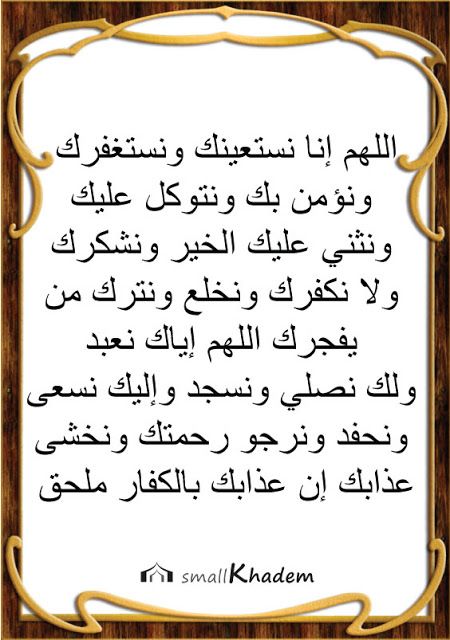
But they preferred reciting Qunoot after bowing and standing because Saheeh sunnah mentions it more often. Fuqaha’ among the scholars of hadith, such as Ahmad, say that both are allowed as Saheeh Sunnah mentions both. And some say that supplicator should only recite it after bowing(rukoo). According to some narrators, one should recite Qunoot before bowing. However, reciting it after bowing is better.Ībout Qunoot: there are two extreme views and one middle (or moderate) view. When to recite Dua e Qunoot?ĭua Qunoot is recited in the last Rak’ ah of Witr prayer after bowing, but if one recites it before turning, it is okay.

He (PBUH) often recited it during Witr, Fajr, and sometimes during other prayers throughout the year.

Prophet Muhammad (S.A.W) recited Dua Qunoot whenever Muslims passed through a significant difficulty or disaster. In Dua e Qunoot we ask Allah for blessings, guidance, and strength. In Arabic, Qunoot means being obedient, or it is the act of standing. Here we will learn Dua Qunoot English and Dua Qunoot transliteration. Dua Qunoot is one Dua that the Prophet Mohammad (PBUH) has taught us to show humility, obedience, and devotion to Allah. And there’s no better way to stay connected with Allah than prayers and supplications. "O our Rabb !! We seek of You good in this world and good in the Hereafter and safety from the torment of Hell." Or they should recite “Allahummaghfirlana” thrice.One of the best rewards in this world is being close to Allah. If anyone doesn't know Qunoot Dua, he can recite the following dua:Īllahuma Rab-banaa Aatinaa Fid-dunyaa Hasanatan Wa Fil Aakhirati Hasanatan Wa Qinaa'Azaaban Naar. Indeed Your punishment will grasp the disbelievers."

And we hope for Your mercy and fear Your punishment. And towards You only do we rush, and present ourselves for service. O Allah !! You alone we worship and for You only we offer the Prayer and the prostration. "O Allah !! We seek Your help and seek Your forgiveness - and we believe in You and rely on You - and we praise You with all goodness - and we are thankful to You and not ungrateful to You - and we separate from and forsake whoever offends You. Hazrat Ayesha Radi Allahu Anhu reported in Abu Dawood and Tirmidhi hadith that the Holy Prophet sallallahu alaihi wasallam used to offer 3 Cycles in the Witr Prayer. The Witr Prayer is Essential (Wajib) in the Night (Isha) Prayer.Īllahuma innaa nastaeenuka wa nastaghfiruka wa numinu bika wa natawakkalu alayka wa nusnee alaykal-khayra, wa nashkuruka wa laa nakfuruka wa nakhlaoo wa natruku maiy- yafjuruk, Allaahumma iyyaka nabudu wa laka nusallee wa nasjudu wa ilayka nasaa wa nahfidu wa narjoo rahmataka wa nakhshaa azaabaka inna azaabaka bilkuffari mulhiq. Dua-e-Qunoot is recited in the third rakat of Witr (Witar) Salaah in Isha Prayer.Ībdullah ibn Abbas Radi Allahu Anhu that the Holy Prophet sallallahu alaihi wasallam offered 3 Cycles (Rakaats) in the Witr Prayer as reported in Saheeh Muslim


 0 kommentar(er)
0 kommentar(er)
